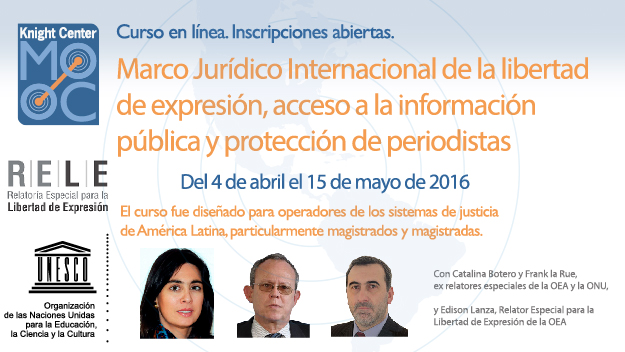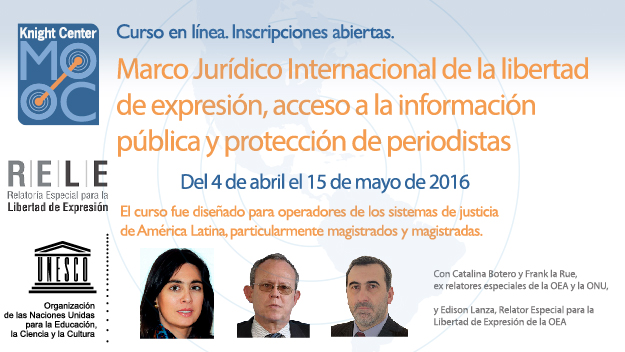
The fourth edition of the online course “International Legal Framework on Freedom of Expression, Access to Information and the Safety of Journalists” began on April 4 with the participation of 624 judges and other judicial operators (prosecutors, attorneys, lawyers, etc.) in Latin America.
The course, designed as a massive open online course (MOOC) from the Knight Center for Journalism in the Americas, seeks to train justice officials on international standards of freedom of expression and access to public information, as well as emphasize the important role that judges have in defending these freedoms.

These 624 participants join more than 2,200 judicial operators trained in previous editions of the course, which means that almost 3,000 justice system workers in the region will have been trained in these courses once this version ends.
The training is offered by the United Nations Educational, Scientific and Cultural Organization (UNESCO) and the Special Rapporteur for Freedom of Expression of the Inter-American Court on Human Rights (IACHR), with support from the Knight Center for Journalism in the Americas at the University of Texas at Austin.
“With this project, I think we’ve proven the effectiveness of massive open online courses to bring important concepts of the international legal framework to judges and other judicial operators from various countries in the region. We have received very positive evaluations from students who took the three previous courses, and with each edition, we are improving the quality of the program,” said professor Rosental Calmon Alves, director and founder of the Knight Center. “We are very grateful to UNESCO and the Special Rapporteur of the IACHR for the confidence they place in the distance learning program from the Knight Center at the University of Texas to undertake this innovative project.”
Until May 15, participants will focus on issues like the role of justice officials in investigation and prosecution of crimes committed against journalists and human rights defenders, the challenges involving the use of criminal law to ensure a right to freedom of expression and opinion, new challenges to freedom of expression related to the internet, the right to public information and diversity and pluralism in the media.
Instructors are Catalina Botero, former Special Rapporteur for Freedom of Expression at the IACHR, and Frank la Rue, former UN Special Rapporteur on the Promotion and Protection of the Right to Freedom of Opinion and Expression. The current Special Rapporteur for Freedom of Expression at the IACHR, Edison Lanza, and UNESCO’s representative in South America Guilherme Canela, also participate.
“Once again, we are looking at a historic moment. It is the first time that many judicial operators from all of Latin Americas countries will be exchanging knowledge, doubts and concerns about international standards on freedom of expression,” said Lidia Brito, Director of the Regional Office of Science for Latin America and the Caribbean of UNESCO, according to a press release from the organization.
UNESCO and the Special Rapporteur offered a pilot version of this course directed exclusively to judicial officials in Mexico in November 2014. In September 2015, a similar course designed exclusively for judicial operators in Coahuila, México was offered. This was the first course of its kind offered at the state level. Finally, in late 2015, the course was offered at the Latin American level.

Knight Center for Journalism in the Americas
300 West Dean Keeton
Room 3.212
Austin, TX, 78712
Phone: 512-471-1391
Email: journalismcourses@austin.utexas.edu